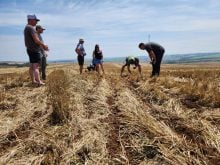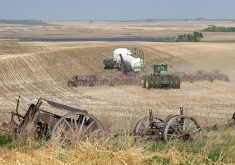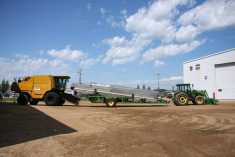Glacier FarmMedia – Farm Credit Canada (FCC) has formed a new partnership with MaRS Discovery District, a Toronto-based technology innovation hub.
FCC is becoming a more aggressive investor and mover in the agriculture technology space.
It recently committed to invest $2 billion in equity into agriculture and food technology.
Read Also

Farmers urged to be grain-safe this fall
Working around grain bins comes with risk, from farmers falling to drowning in grain: Experts have five tips to help avoid grain-related accidents this harvest.
Graeme Millen, vice-president of strategic finance and business development with FCC, said the MaRS partnership is meant to help support the ecosystem to make the investments made from the $2 billion fund successful.
The company already has partnerships in many farm-level agtech accelerators and funders across the country. The MaRS partnership brings expertise in other sectors to agriculture and food.
“And as an organization, they’ve really established themselves as one of, if not the leading, innovation hub in Canada and one of the leading innovation hubs in North America,” said Millen.
“They have a real centre of gravity as it relates to capital, entrepreneurs, ecosystem partners across a variety of technologies, including a lot of deeper technologies, these scientific technologies,” he added.
MaRS has among its founders Ken Knox, a former deputy agriculture minister in Ontario and a member of the Ontario Agriculture Hall of Fame, but its work in agriculture has been limited, said Millen.
Agriculture and food have not been around the table in many innovation circles, said Millen, so taking it directly to the heart of an organization such as MaRS can provide new connections with innovators, customers and investors.
The MaRS Food and AgTech Mission will focus more on the food supply chain than on farm-level technologies, said Tyler Hamilton, senior director of climate MarS Discovery District.
The project will bring together a national coalition of food industry leaders and funders, including Telus Agriculture and Consumer Goods, the Arrell Family Foundation, Wittington Ventures (the Weston family’s venture funding company) and S2G Investments.
It will also bring together six industry leaders from corporations who will work with up to 10 Canadian start-up companies developing agriculture and food supply chain innovations.
The focus will be on reducing emissions, cutting waste, improving efficiency and building resilience in food systems.
Hamilton said FCC liked that MaRS has partnerships across other sectors.
“We can bring an out-of-the-box lens to the issues, like technologies we have worked with in mining or the energy sector, or some other sector that could be applied in agriculture and it hasn’t been thought of before.”
The Food and AgTech Mission will mirror similar projects in which sectors are targeted with significant opportunities or barriers holding back growth. Hamilton said its Better Buildings Mission works with major players in construction and real estate.
















